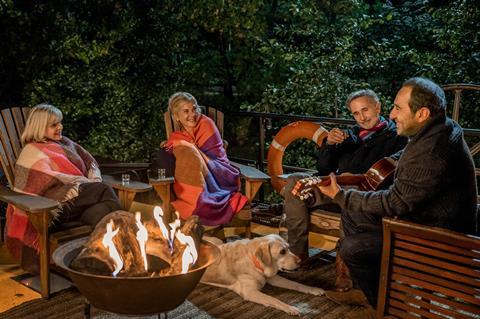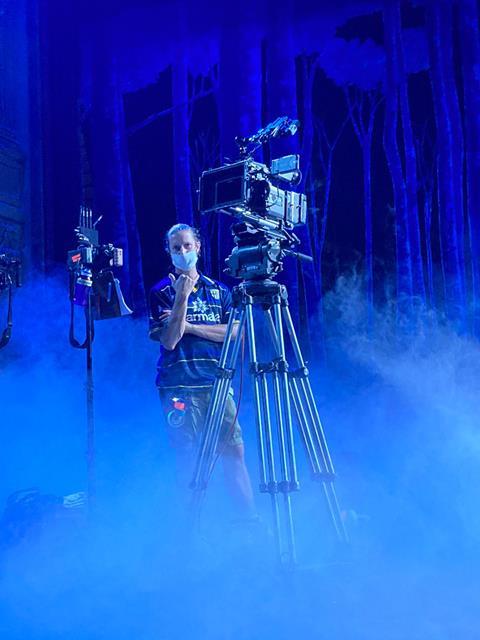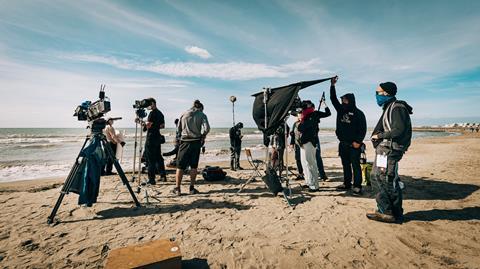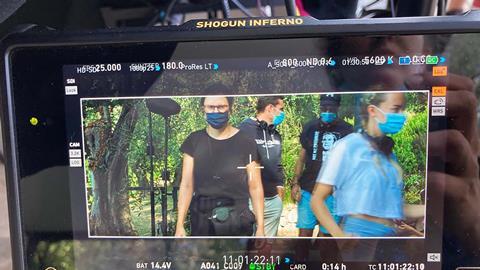The French film and TV industry was swift to return to set this summer as a two-month national Covid-19 lockdown started to ease from mid-May — so much so that local production levels from July to September were higher than in 2019.
“Live studio shows and soaps were the first to go back in the beginning of June, with films and high-end drama following at the end of July,” says Stéphane Bedin, deputy director of French technicians body FICAM.
Two elements helped fast track the recovery: the relatively quick implementation of industry-wide hygiene standards, and the creation in May of a government-backed $120m (€100m) indemnity fund to cover losses if a shoot is forced to shut down due to the coronavirus.
For the fund, the National Cinema Centre (CNC) put up $60m (€50m), which was matched by another $60m from private insurers Aréas Assurances, Macif and Matmut, who were called on by French president Emmanuel Macron to play their part. It covers up to five weeks of interruption and the maximum claim per production is $1.4m (€1.2m). With this in place, stalled productions rushed to resume shooting, while producers with upcoming features and TV shows also moved fast for fear of a second wave and another potential lockdown.
In the face of this heightened competition, producer Maxime Delauney at Nolita Cinema was among those scrambling in June to get finance, cast and crew for actress/filmmaker Michele Laroque’s Dancing On (Alors, On Danse). The remake of the 2017 UK romantic comedy Finding Your Feet subsequently shot outside Paris from the second week of August to late September. Alongside Laroque, the film’s cast includes Thierry Lhermitte, Isabelle Nanty, Jean-Hugues Anglade, Jeanne Balibar and Patrick Timsit, all of whom were much in demand as lockdown eased.
“We were supposed to shoot later but had to bring the date forward due to a change in commitments for two key cast members,” explains Delauney. “It was a race to close the finance at the same time as working on pre-production and the final touches to the screenplay, but in the end it was probably to our advantage.”

While there were no major changes to the screenplay in response to hygiene protocols, sets were reconfigured to allow for better social distancing and the number of people present was kept to a bare minimum. “There was regular testing and a doctor and nurse on site throughout but we were also very reliant on collective responsibility of those on set and had to count on their honesty if they suspected they might be sick,” adds Delauney.
In addition, Timsit was working concurrently on Jean-Claude Van Damme’s Netflix feature The Last Mercenary, which shot partly in Ukraine in August as well as France. “He was being tested every time he entered Ukraine or France,” says Delauney. “If you ask him, he’ll tell you he spent the whole of August being tested for Covid-19.”
The state-backed indemnity fund was, he says, key to the shoot being able to go ahead for the production, which is budgeted at around $6m (€5m). “One of the biggest issues for everyone in this business is the insurance,” says the producer. “We couldn’t take on the risk of the production being shut down due to the virus on our own.”
Behind closed doors
Veteran producer Alain Attal should have been in China this autumn for the shoot of Guillaume Canet’s $72m (€60m) live-action feature Asterix & Obelix: The Silk Road. It is his most ambitious project to date with Canet, with whom he has been collaborating since the actor/filmmaker’s 2000 short J’Peux Pas Dormir. The pandemic disrupted plans to begin shooting in France in June, followed by a stint in China in September, and production is now scheduled for April 2021.
“It was too risky. It involves a big cast and lots of extras and crew. There were too many unknowns at the time, so we decided to push it back,” recounts Attal, whose Trésor Films is producing with French companies Les Enfants Terribles and Pathé Films.
The producer instead spent September on the Breton island of Belle Ile for the shoot of Lui, an impromptu, personal project written by Canet while he was living in lockdown along with the rest of France over spring and early summer. Canet directs and stars as a composer at a professional and personal crossroad in his life. He retreats to his house in Brittany, where he is visited by a succession of characters at the heart of his life: his wife, lover, best friend, parents and his doctor. The cast features Virginie Efira, Mathieu Kassovitz, Laetitia Casta, Nathalie Baye and Patrick Chesnais.
“After we took the decision to delay Asterix & Obelix, Guillaume was a bit like an orphan without a film,” says Attal. “He imagined a film that could be made under the current conditions of the pandemic and has come up with a sort of huis clos [meaning ‘behind closed doors’], taking inspiration from the confinement.”
The $6.6m (€5.5m) production spent 24 days shooting on Belle Ile from mid-September. Situated some 14km off the Breton coast, the island is renowned for its rugged beauty and is a tourist hotspot in the summer. “We were there at the beginning of autumn when most of the tourists had gone,” says Attal. “We decided to keep it a very intimate shoot with just the actors and a light crew.”
In September, the department of Morbihan, within which Belle Ile is situated, had one of the lowest incidences of Covid-19 in France, although the number of cases has since crept up. “We were in a place that was very protected from the virus and we took care to make sure we didn’t bring it in from Paris,” explains Attal. “Because we were on an island, there was no travelling back and forth to Paris and anybody who joined the set part way through was tested before being allowed on.
“We had a warm welcome from the locals, partly because they could see we were taking the hygiene measures seriously,” he continues. “The island, with its wild beauty, is one of the protagonists of the film and we didn’t want to do anything to harm it.”
Like Delauney, Attal stresses the state-backed indemnity fund was key for low- to medium-budget films being able to get off the ground. “We fought hard with our professional organisations and the CNC to obtain this fund,” he says. “It’s indispensable for productions like Lui although, thanks to all the hygiene measures we had in place, we didn’t have reason to tap into it.”
Covid complexities

Even with the safety net of the indemnity fund, shooting in the era of Covid-19 can be a nerve-racking and complex endeavour. Producer Sebastien Aubert recounts how his Cannes-based Adastra Films faced an eleventh-hour drama on Finnish director Aino Suni’s psychological thriller A Girl’s Room. An actress in a key supporting role tested positive for the virus just as cameras were due to start rolling in the south of France in August.
Adastra Films is the majority co-producer on the $1.4m (€1.2m) co-production alongside Oma Inge Film, the German company behind System Crasher, and Finland’s Made. Finnish actress Elsi Sloan stars as a teen forced to move to the south of France with her mother, where she falls under the spell of a charismatic ballerina with a double life. “We had two options — either delay the shoot by a week, 10 days, but we couldn’t afford that, or find a replacement within 24 hours,” Aubert recounts.
In the end the production recast an actress who had been selected for another role in the film. “There have been coronavirus-related nightmares but that was one of our toughest moments,” he recalls. “She wasn’t a complete unknown but the director still had only an hour to make up her mind so we could get the tests done in time.”
There have also been other challenges linked to the fact the feature is a co-production, with filming also taking place in Germany and Finland in October. “While we were covered by the indemnity fund in France, no such Covid-19 cover exists in Germany so we informally agreed to share the risk, if shooting had to be delayed,” Aubert says, speaking to Screen mid-shoot from Hamburg in October. “We have tested the cast and crew three times now and every time our hearts are in our mouths.” Another consequence of the pandemic was that, rather than using the same crew for the entire shoot, the production had to hire separate crews for each territory, which also pushed up costs.
As the November print issue of Screen went to press, the short- to mid-term situation for production in France and Europe at large was looking uncertain with Covid-19 cases and hygiene restrictions ratcheting up across the region. France entered a fresh lockdown on October 30. Film and TV shoots were among the professional activities exempted from the restrictions, however, as part of the government’s efforts to keep the economy turning over. Against this backdrop, Attal is still planning to kickstart pre-production on Asterix & Obelix: The Silk Road this month for its rescheduled shoot, beginning in April 2021.
“It’s difficult but this sort of film needs to be prepared well in advance,” he says. “The fabric of production in France is robust and ingenious. If you throw us out the door, we’ll come back through the window. We have to believe in our lucky star and hope that as time passes things will sort themselves out.”
International shoots in France
France’s domestic film and TV production scene may have ramped up activity over the summer and early autumn, but big international productions remain elusive and are not expected back in the territory before spring 2021. “We’re waiting with impatience for the return of the Americans when they’re a bit less traumatised by Covid-19 and everything else that’s going on, but I can’t see anything happening at least until the elections are over,” says Paris-based producer and production manager Raphaël Benoliel, referring to the US presidential elections on November 3. Luckily for Benoliel, a go-to figure in France’s international production scene, this quiet period comes after a busy streak working on productions such as Darren Star’s Netflix series Emily In Paris and 2018’s Mission: Impossible — Fallout.
“I can’t see any big productions coming in before the end of the first quarter of 2021,” agrees Michel Gomez, head of Paris City Hall’s Mission Cinema department, forecasting 30%‑40% fewer shooting hours in the French capital in 2020 due to their absence.

A handful of European productions have travelled to France in recent months, however, including the second series of Urban Myth Films’ War Of The Worlds for Canal+ and Fox, Danish director Niels Arden Oplev’s feature Rose, and German TV film franchise Ein Tisch In Der Provence, which translates as ‘A Table In Provence’. The latter, a family drama revolving around a country doctor’s practice, is in the middle of a 45-day shoot around the villages and countryside outside the historic medieval town of Aigues-Mortes in the southern French region of Occitanie.
“We are shooting two 90-minute TV movies side-by-side. It’s the second year running that we’re doing this,” explains Valentin Holch of Hamburg-based Polyphon Pictures, which is producing the show for broadcaster ZDF. “If we can finish the shoot, they will air next April. For German producers, wherever we’re shooting, the situation is very complicated because we have no insurance covering us if we have to stop shooting because of Covid-19, so we take every precaution possible.”
These safeguards involve regular testing of the nearly 100% German cast and crew. They are living and working as a bubble, housed in an apartment hotel complex and keeping contact with the local population to a minimum.
“We can be together as a big cluster but we try not to be in touch with the outside world,” says production assistant Melanie Lachner. She notes that one major challenge has been finding a local lab that can process Covid-19 test results in a speedy manner. “The labs here are too small to deal with our capacity so we’ve started sending our tests to Germany, where we have a lab that can give us the results in three or four hours.” At $84 (€70) per test plus the shipping charges, it has added a substantial extra cost to the production, which is conducting around 50 to 60 tests each week.
Another precaution has been keeping the numbers of local extras on the set to a minimum. “Normally we’d have around 20 local extras. This year we have only five,” says Holch, adding that the production will be relying more on drone footage of the nearby countryside to infuse a sense of its French setting than in the previous two films.
In spite of these measures, Holch says the production remains on a knife edge, revealing that shooting has already come to a halt once after a suspected case of Covid-19 within the crew — which turned out to be a false alarm. “As a producer, I’ve never felt such a strong sense of responsibility around keeping the people on the production safe. Covid-19 has brought another dimension. We all feel the pressure.”


























No comments yet